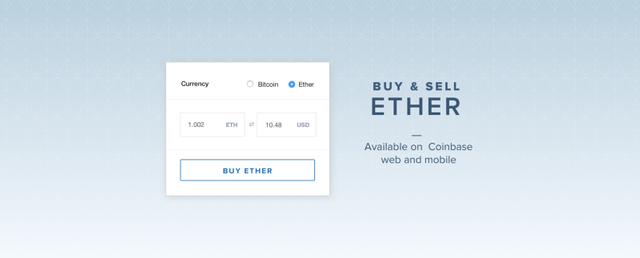A Fork in the Road
I’ve been fielding a lot of questions from people about Ethereum, the DAO, and the upcoming hard fork, so I thought I’d write this blog post to explain why I’m a strong believer in its future.Cryptocurrencies are a dime a dozen these days, but after Bitcoin, the only currency that I’ve invested time and money into has been Ethereum. Over the last few months, my coworkers and I have added Ethereum trading to our digital currency exchange (GDAX) and, as of today, to our user-friendly app (Coinbase).

Why Ethereum?
There are two reasons why I’m excited about Ethereum — the strength of the protocol and the ability of its community to execute.Let’s start with the first — Ethereum enables financial applications that simply weren’t possible a year ago, because it marries a decentralized payments network with a robust high-level programming language.To put this into perspective, with Bitcoin you can write a transaction that transfers money between two people anywhere in the world, without a bank. With Ethereum you can do the same thing, but add conditional logic. For example, only transfer money if the price of Tesla stock climbs over $300 at 9am tomorrow. This has far reaching implications — Bitcoin promises to decentralize money transmission, but Ethereum promises to decentralize everything from contracts to financial derivatives (a multi-trillion dollar industry).
Ethereum promises to decentralize a multi-trillion dollar financial industry.
The most impressive Ethereum application is the DAO, a decentralized autonomous organization which raised over $150 million dollars from people, the largest crowdfunding campaign in human history. At its core, the DAO is very simple — it’s a piece of code on Ethereum that lets people invest money and vote democratically on how it should be spent.
A Strange Turn of Events
The DAO (not to be confused with the generic term dao) has brought its fair share of controversy to Ethereum. A summary of recent events sounds like something straight out of a cyberpunk novel:
- A 7 month-old digital currency reached a market capitalization of over $1.1 billion dollars.
- An autonomous, self governing computer program built on this network raised over $150 million dollars of investment capital.
- A malicious user found a loophole in the program and began an attack to drain its funds.
- Community members responded with counter attacks, eventually succeeding in halting (but not reversing) the attack.
To be clear, Ethereum itself isn’t vulnerable — we see no reason to believe that there is any danger to the core protocol. The loophole lies in a specific program that runs on Ethereum, built by a third party — much like an app on running on your smartphone.But the community was faced with a hard choice — undo the attack with a hard fork (a protocol change) that raises philosophical questions about the sanctity and immutability of transactions on the network, or do nothing and see the attacker walk away with other people’s money.Any founder will tell you that if you want to build something that changes the world, moments of existential crises are the norm, not the exception. It follows then, that an organization’s strength is not measured by the absence of crises, but by its ability to execute quickly and overcome them. By that measure, Ethereum shows promise — in a few weeks, they’ve had constructive conversations around a controversial topic, reached a decision and executed on a solution.
An organization’s strength is not measured by the absence of crises, but by its ability to execute quickly and overcome them
At the time of writing, we’re a little over a day past the hard fork and the value of Ethereum on the longest chain is still holding steady.Ethereum, like all great innovations, is not without inherent risk — the protocol is nowhere near as mature as Bitcoin, consensus around the recent hard fork isn’t universal and the power of its scripting language is a double-edged sword. But what it has brought to the crypto community is a pace of relentless innovation that I haven’t seen since the rise of Bitcoin. And this is why we at Coinbase have spent the better part of the last few months bringing Ethereum to our users.
The Road Ahead
Digital currencies are enablers — by eliminating friction in transferring value around the globe, we can help people execute on ideas more quickly and bring equality of opportunity to everyone.The first pillar of our strategy at Coinbase is to make it easy to buy and sell digital currencies — the launch of Ethereum trading and our expansion into more countries will make digital currencies even more accessible.The second pillar of our strategy is to help the industry grow by building prototypes of new financial apps. From prediction marketplaces to decentralized crowdfunding, the future is bright for the the Ethereum network and we will see it change the way value is transferred around the world.If you’re excited by our vision and want to help build the financial network of the future, we’re hiring both for our SF office and remote positions. You can apply on our careers page or send us an email (talent at coinbase dot com).
Source : medium.com